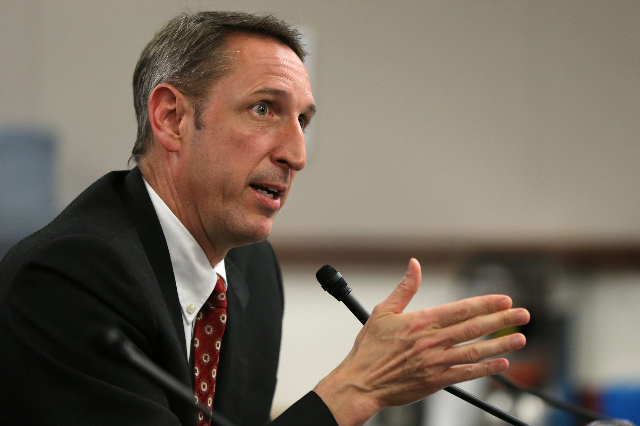Private school parents decry education savings account rule

Parents with students currently attending private school and who teach their children at home voiced their opposition Friday to proposed regulations that require enrollment in a public school for 100 days before they can access Nevada‘s upcoming education savings accounts.
At a workshop to gather public comment on the regulation, dozens of parents told state Treasurer Dan Schwartz that the 100-day requirement effectively punishes them for already pulling their students out of the public school system.
Some private school operators also warned that families, hoping to gain eligibility for the education grants, would flock to traditional school districts with already crowded classrooms.
"It would be to the detriment of the child to uproot them from their school of choice, their friends, their teachers, their peers, their school community to meet the 100-day requirement," said Catherine Thompson, school superintendent for the Roman Catholic Diocese of Las Vegas, which operates Bishop Gorman High School and six other private schools across the valley. "It is not only wholly disruptive to the child‘s educational experience but it negatively impacts the child‘s academic achievement.
"Moreover," she added, "the student‘s space at the private school might not be available any longer should they leave and attempt to come back."
Late last month, Schwartz issued draft regulations that establish eligibility and enrollment periods for students to apply for an education savings account, or ESA.
Senate Bill 302, which Republicans pushed through the recent legislative session, allows grants of about $5,000 for students to attend private or religious schools, or for home schooling. Students must be enrolled in a public school or charter school for 100 consecutive days before they qualify for a grant, though enrollment does not include extracurricular or after-school activities.
The ESA regulations do not apply to Opportunity Scholarships, a separate program offered through the Nevada Department of Education that offers tax breaks for businesses that provide grants for students to attend private schools.
While most speakers at the workshop addressed the 100-day rule, some critics of SB 302 attended the meeting to challenge the bill‘s overall legitimacy.
They questioned whether the Nevada constitution prohibits the use of public funds for parochial education and urged Schwartz to include accountability measures and testing requirements in the ESA regulations.
But state Sen. Scott Hammond, R-Las Vegas, the primary sponsor of SB 302, pushed back against that proposal.
For parents, "their top priority is not whether or not a child is going to pass a standardized test," Hammond sat at the workshop. "Their top priority is are they coming home talking about how excited they were about a particular science experiment or about their particular teacher."
Contact Neal Morton at nmorton@reviewjournal.com or 702-383-0279. Find him on Twitter: @nealtmorton












